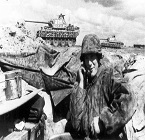Zemke
Posts: 642
Joined: 1/14/2003
From: Oklahoma
Status: offline

|
malyhin1517
I want to say that the Germans had problems with logistics because they did not expect to face such fierce resistance from the Soviet troops! According to the plan, the main forces of the Red Army were to be destroyed on the border, and there should be no further serious battles, so no one calculated the resources necessary for the army. I personally do not think that the Soviet generals made many mistakes, they just did not have time to respond to the rapid advance of German tank wedges, and the Soviet mechanized corps were mostly incapable of combat. And there is no need to blame General Moroz and bad Russian roads for Germany's loss! The Russians fought in the same conditions. The Germans were simply unprepared for such conditions of war. Germany lost because it underestimated the enemy, the German leadership spoke about this directly later.
[/quote]
The facts are little more subtle than this. The German General Staff (GGS) did predict the logistical limits of the German Army (Heer). You are correct that the expectation was the war would be won in the first month, by destroying the vast majority of the Soviet Army from the border to 350 km into the interior, which is exactly what happened. What was NOT expected or planned for was the Soviet Union's ability to generate new forces again and again. These new units that were not particularly well trained or lead, but dug in, they were good enough.
I agree the both sides had to contend with the same weather conditions, but it is a lot easier for the Soviets in 41 to bring fuel, ammo, food and replacements from the rail yards of Moscow, than Berlin in October of 41.
What I think was brilliant of the senior Soviet leadership, mostly because of the timing, (and this is a credit to Zhukov) was when they launched their winter offensive, although they got a little carried away with it by the end of February 42, and should have stopped and been satisfied with their gains, but Stalin got greedy and pushed for more, and ended up losing hundreds of thousands of men needlessly. I guess melomaniac personalities (Stalin and Hitler) have trouble accepting good advice.
I would also say that the Soviet soldiers in the border regions surrendered more often than they fought to the bitter end, (exceptions noted). I think the reason you see the fierce resistance increase as the Summer of 41 goes into Fall the average Soviet Soldier hears what is happening to their fellow countrymen in the German prison of war camps, (starved to death), and as word spreads how badly the Germans were treating prisoners and the the civilian population, I am not surprised most of them chose to die in combat by fight bitterly to the end.
< Message edited by Zemke -- 9/13/2021 8:26:09 PM >
_____________________________
"Actions Speak Louder than Words"
|
 Printable Version
Printable Version














 New Messages
New Messages No New Messages
No New Messages Hot Topic w/ New Messages
Hot Topic w/ New Messages Hot Topic w/o New Messages
Hot Topic w/o New Messages Locked w/ New Messages
Locked w/ New Messages Locked w/o New Messages
Locked w/o New Messages Post New Thread
Post New Thread